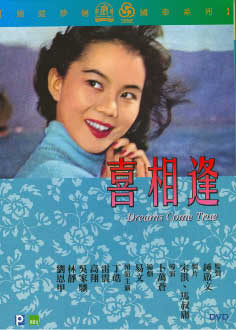Dreams Come True

Director: Bu Wan-Cang
Year: 1960
Rating: 6.0
Cinderella type films
were very common in Hong Kong during the 1950’s and 60’s when there was a
large divide between the rich and poor in that city. These films played to
people’s fantasies that with just a little bit of luck you could move out
of poverty into the comfort of a life with large houses, sleek cars, fine
clothes and servants. In general, these were romances in which people from
opposite classes meet, fall in love and run into societal or family opposition.
This 1960 Cathay film plays out very lightly – more a screwball comedy akin
to a 1930’s depression era Jean Arthur film than a serious melodrama or social
critique. The plot is paper thin and the characters not much deeper, but
it has its charms which are primarily derived from the wide-eyed mugging
of Kitty Ting Hao.

There can’t be much doubt as to why she picked up the moniker of “Kitty”
– she definitely has some feline features around the face and eyes and often
takes on the satisfied countenance of a cat that ate the cream. Her sharply
angled eyebrows act as exclamation points for the myriad of fluid expressions
that dot her face throughout this film. She really is as cute as a kitten
playing with a string in this one. She plays Fang Fang, a flower girl who
walks out into the countryside early every day to buy fresh flowers and then
attempts to sell them at strategic points within the city. In a little ditty
she sings to herself about which flowers are easy to sell to what parties
“White orchids are easy to sell. Dating people like to buy them. Christmas
flowers are easy to sell. Every Christian needs them. Ya-ho-yi-dar-yo”. Like
every Cinderella story there have to be villains and here we have a few of
them – a stepmother who hits her if enough flowers aren’t sold and a pair
of minor league triads who demand protection money from her. These must
be hard times because these two chase after her for the entire movie to collect
their monthly $5 protection fee!

One day while selling flowers at the pier she is forced to hide from the
cops and jumps into a parked car and then can’t figure how to get out - this
is where the Cinderella bit begins. A wealthy family has gone to meet the
daughter of a family friend who lives in San Francisco and is coming to Hong
Kong for the first time. All they have is an old photo of her and when they
see Fang Fang in their car they assume she is Miss Feng due to a strong resemblance.
They greet her happily and take her to their home as a guest and Kitty just
goes along for the ride. Only the older son Xihong (played by Kelly Lai Chen)
knows who she really is but he is so mesmerized by her hypnotic eyebrows that
he completely falls under her spell and just lets the scenario play out.
Living in the lap of luxury is more than o.k. by Kitty and she literally does
somersaults and rolls on the plush carpeting. Trouble is that she knows nothing
about this girl that she is suppose to be – not even that San Francisco is
a city and her perceived odd behavior is first put down as American and then
that she must be having a nervous breakdown and should be institutionalized!

This gets her to do a quick exit out the window but she ends up literally
in the dog house and has to pretend to be sleepwalking to get back inside.
Eventually, the real Miss Feng arrives in Hong Kong and lo and behold is a
nearsighted bucktoothed version of Fang Fang (played again by Kitty) – and
Fang Fang’s parents grab her and take her to their hovel thinking this is
their daughter. In the meantime love has bloomed between Fang Fang and the
Xihong but of course she is a poor flower seller and he the heir to wealth
– but this isn’t real life thankfully and so we can sit back in the surety
that love will win the hearts and minds of all. Also in the film are the jovial
Liu Enjia as Fang Fang’s father and Wu Jiaxiang as the westernized doctor
intent on committing Fang Fang.






